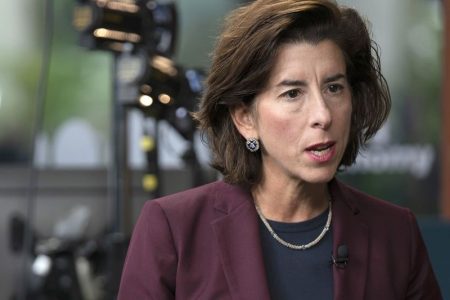Raimondo said the initiative to boost domestic microchip production would lead to more jobs for unionized workers.
“I am extremely focused on making sure that every penny is implemented and is transparent and that we get out of this investment what we need so that we create good jobs — good, union, high-paying jobs in America,” Raimondo said. “And there will be strings attached.”
When pressed about whether the Commerce Department would make workforce unionization one of those strings, Raimondo demurred.
“It’s premature to say,” Raimondo said, sitting a few feet away from UAW President Ray Curry.
The new wrinkle of potentially tying subsidies of chip manufacturing to union jobs comes as Michigan Sen. Debbie Stabenow and U.S. Rep. Dan Kildee are trying to get an additional $4,500 tax credit for EVs assembled in U.S. factories represented by a labor union added to Biden’s Build Back Better social spending bill.
Biden endorsed the Stabenow-Kildee provision during a visit to GM’s Factory One EV plant in Detroit earlier this month. Curry, the UAW president, mentioned the Stabenow-Kildee provision during remarks Monday about the need for passage of both the Build Back Better bill and the microchip production legislation.
Auto executives who attended Monday’s meeting with Raimondo said the year-long shortage of microchips has not eased much in the second half of the year.
“It’s still very hand-to-mouth,” Lear CEO Ray Scott said. “Are we better than the second quarter? Yes … but it’s literally daily line-of-sight in inventories.”
After months of idled plants and decreased output of new vehicles, automakers are eager to get a national public policy focused on boosting domestic production of microchips.
“We need to get beyond the meetings and get additional chips,” said Jonathan Jennings, Ford’s vice president of global commodity purchasing and supplier technical assistance.
During a Detroit Economic Club meeting at MotorCity Casino Hotel following the roundtable, Raimondo said the commerce department received more than 150 responses to a request for information sent to chip manufacturers in September to share information about inventories, demand and delivery. The department is expected to release a detailed report on the responses in the coming weeks.
“We’re trying to get an accurate demand signal,” she said. “We just don’t have the supply.”
Producing semiconductors domestically is vital for President Joe Biden’s goal of ensuring 50 percent of all U.S. vehicles on the road are electric within the next 10 years. Raimondo said the U.S. at one point produced 40 percent of the world’s semiconductors, but that number has dwindled to zero as other nations, namely Taiwan, took over production.
Raimondo said she is confident the CHIPS Act will also be passed by the House.
“We need to pass the CHIPS Act immediately. The stakes are just that high,” Raimondo said. “We can’t wait because the rest of the world isn’t waiting.”
The UAW visit was attended by all Democratic politicians.
U.S. Rep. Debbie Dingell, a Dearborn Democrat who organized the roundtable event, said Republican Rep. Fred Upton of St. Joseph wanted to attend the event, but could not make it work for his schedule.
Dingell emphasized the microchip legislation is more of a matter of protecting American interests in manufacturing and not being so reliant on a far-reaching supply chain, than protecting the interests of labor unions closely aligned with her political party.
“This is not a partisan issue,” Dingell said.
She later added: “We’re not going to let China kick our ass. We’re going to kick China’s ass.”
U.S. microchip production has fallen from more than one-third of the global supply three decades ago to 12 percent, according to the Semiconductor Industry Association.
The majority of microchips are produced in Taiwan, Raimondo said.
“We can’t rely on foreign countries to send us these chips,” U.S. Sen. Gary Peters said. “If we’re not building it here in the United States, we’re going to be in serious trouble.”
Gov. Gretchen Whitmer, who also attended Monday’s event with Raimondo, traveled to California in mid-November to pitch Michigan as a location for a microchip plant during the Semiconductor Industry Association’s annual conference in San Jose.
Whitmer said she and MEDC CEO Quentin Messer Jr.’s pitch for Michigan to chip manufacturers “was very well received.”
“The industry is watching very closely what happens with this CHIPs Act,” Whitmer said. “They’re making decisions about investment.”

